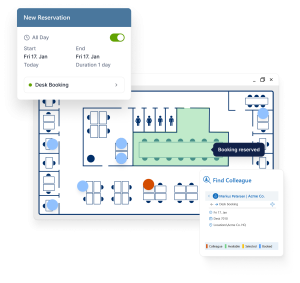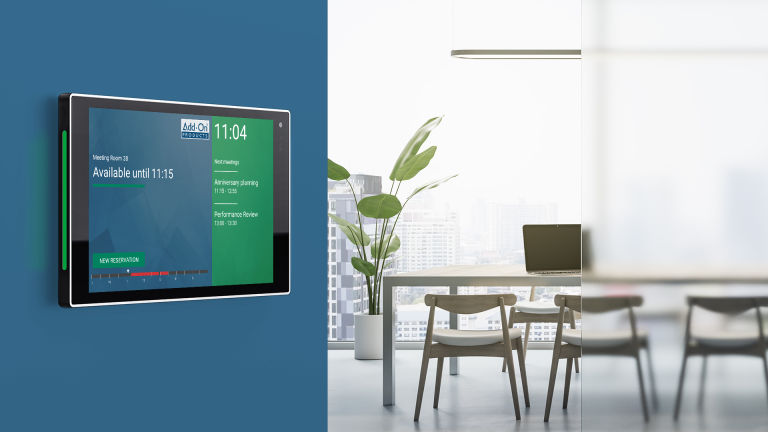Modern workplaces demand efficiency, flexibility, and comfort to keep employees engaged and productive. Businesses are shifting toward hybrid and flexible work models, requiring solutions that streamline workspace reservations and prevent overcrowding. Desk booking software provides a seamless way to manage office space, ensuring employees have the proper setup for their needs while optimizing resource utilization.
This article explores the advantages of desk booking technology, its role in enhancing ergonomic comfort, and the importance of reliable connectivity in modern office environments.
The Importance of Flexible Desk Booking in Modern Workplaces
The workplace has evolved, with many businesses adopting hybrid work arrangements. Employees no longer have assigned desks, and office spaces must accommodate fluctuating attendance. Desk booking software allows companies to manage workspace reservations efficiently, ensuring employees can secure the best work environment.
Planning improves productivity and collaboration. Employees can reserve desks suited to their specific needs, whether they require a quiet space for deep work or a collaborative area for team discussions. Businesses benefit from streamlined office management, avoiding unnecessary real estate expenses and ensuring optimal use of available space.
Organizations increasingly recognize the advantages of hybrid and flexible work models. With fewer employees in the office at one time, desk sharing and reservation systems prevent inefficiencies. Properly managed workspaces foster a more adaptable and cost-effective environment that meets both business needs and employee expectations.
Preventing Overcrowding and Enhancing Conference Space Management
Overcrowding in the workplace disrupts operations, creating an uncomfortable environment that hinders productivity. Desk booking software helps mitigate congestion by allowing employees to schedule their workspaces in advance. This ensures a balanced distribution of personnel throughout the office, preventing high-traffic areas from becoming overwhelmed.
Meeting room availability is another common challenge. Without proper coordination, employees may struggle to find a suitable space for essential discussions. Workspace booking apps help businesses manage conference rooms efficiently, ensuring they are available when needed and adequately equipped. These tools provide insights into room usage, allowing organizations to allocate resources more effectively.
Ergonomics and Employee Well-Being: Why the Right Desk Matters
A well-designed workspace is critical to employee health and productivity. Poor ergonomics can contribute to discomfort, chronic pain, and long-term health issues. Many employees experience musculoskeletal problems due to inadequate desk setups, leading to decreased performance and increased absenteeism.
Proper ergonomics improves posture and reduces strain. An adjustable chair, a desk at the right height, and an eye-level monitor help create a healthier work environment. Employees who work in ergonomic spaces report greater comfort and efficiency throughout the day.
The risks of improper ergonomics go beyond temporary discomfort. Long-term exposure to poor workstation setups can result in serious health problems, affecting individual well-being and overall workplace efficiency. Neck and back pain are just some health risks of improper ergonomics, and that’s why the right desk matters for employee well-being.
Businesses can take proactive measures by offering ergonomic assessments and investing in high-quality office furniture. Adjustable desks, ergonomic chairs, and monitor arms allow employees to customize their workstations, promoting long-term health and well-being. Education on proper posture and workstation setup further enhances the benefits of ergonomic office design.
Reliable Connectivity: The Key to a Seamless Desk Booking Experience
A smooth desk booking system depends on fast, reliable internet. Slow or unstable connectivity disrupts reservations, causing frustration for employees trying to secure a workspace. Unreliable internet can prevent access to real-time updates, leading to double bookings and inefficiencies.
Stable connectivity is essential for remote and hybrid workers. Employees who cannot access desk booking systems from home or on the go face unnecessary challenges in planning their workdays. Connectivity issues can also hinder virtual collaboration, reducing the effectiveness of hybrid work models. Unreliable internet connectivity can result in revenue loss from communication delays and IT costs, which is why it is crucial for maintaining workplace efficiency.
To enhance connectivity, businesses should assess their internet infrastructure and implement high-speed networks. Dedicated bandwidth for office applications, reliable Wi-Fi coverage, and failover solutions help prevent disruptions. Organizations prioritizing network reliability create a seamless work environment where employees can focus on tasks without technical setbacks.
Optimizing Workspaces for Future-Proof Efficiency
Desk booking software does more than manage reservations. It integrates with other workspace technologies to enhance overall office functionality. Smart systems can adjust lighting, temperature, and desk height based on individual employee preferences, creating a more personalized and comfortable environment.
Data analytics play a significant role in workspace optimization. Companies can track desk and room usage trends, helping them make informed decisions about office layouts and resource allocation. By analyzing how spaces are utilized, businesses can improve efficiency and adapt their work environments to better suit employee needs.
A forward-thinking approach includes integrating automation and artificial intelligence into office management. Predictive analytics can anticipate workspace demand, while automated systems optimize resource distribution. These innovations reduce administrative overhead and allow facility managers to focus on strategic improvements.
Creating an adaptable workplace benefits both employees and employers. A flexible, data-driven approach allows businesses to respond to changing work habits while maintaining a productive and engaging office environment. Desk booking software is a key component of this strategy, ensuring employees can access the proper workspaces when needed.
Conclusion
As companies continue embracing hybrid models and prioritizing employee well-being, having a system that enables easy, efficient workspace reservations is essential. These platforms do more than help employees find a desk — they optimize office space, reduce congestion, improve ergonomic conditions, and provide dependable connectivity.
By investing in desk booking technology, organizations equip themselves to create smarter, healthier, and more adaptable work environments. The result is a more engaged workforce and a workplace ready to meet future demands.
Free online demo
A member of our experienced team is ready to give you a short demo of any one of our products.





